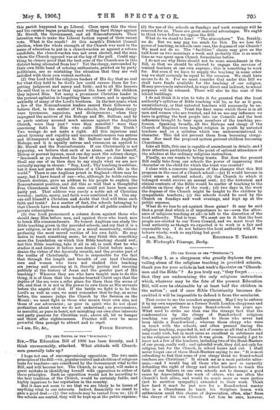[TO TEE EDITOR OF TER " SP RCP ATOR."1
Sin,—The Education Bill of 1906 has been fiercely, and I think unreasonably, attacked. What attitude will Church-
men generally take up ?
' I hope not one of uncompromising opposition. The two main principles of the Bill—viz., popular control and abolition of religious testa for teachers—are considered by the Government vital to the Bill, and will become law. The Church, to my mind, will make a great mistake in identifying herself with opposition to either of these principles. Such an opposition Would not be according to the best tradition of the Church, would be Certainly futile, and highly injurioas to her reputation in the country. But it does not seem to me that we are likely to be losers of anything vital to our interests. Indeed, financially we stand to gain a good deal :—(1) Our schools may be rented from us; (2) if the schools are rented, they' will be kept up at the public expense ; (3) the use of the schools on Sundays and week evenings will be reserved for us. These are great material advantages. We ought to think twice before we oppose the Bill. What do we stand to lose ? "The atmosphere." Yes, frankly, we do. But we may pay too much for this. Do we lose tho power of teaching, in schools once ours, the dogmas of our Church? We need not do so. The "facilities" clause may give us the half-hour on two mornings a week, and probably this is as much time as was spent upon Church formularies before. I do not see why there should not be some amendment in the Bill, so that we should be allowed to engage the services of trained teachers at our own expense ; this is something to work for. But even if we have to supply the teaching in some other way we shall certainly be equal to the occasion. We shall have means to do it. For we must consider that under this Bill we shall have funds available for the teaching of our religion. Money previously subscribed, in ways direct and indirect, to school purposes will be released. There will also be the rent of the school buildings.
I do not think it is wise to take it for granted that the local authority's syllabus of Bible teaching will be, so far as it goes, unsatisfactory, or that untested teachers will necessarily be un- satisfactory teachers. Trust the finer sense which there is in all men and women who are trusted, and let us use any influence we have in getting the best people into our Councils and the best influences brought to bear upon members of the teaching pro- fession. Speaking broadly, all the Bishops and clergy of the Church of England were taught religion in youth by untested teachers and on a syllabus which was undenominational in character. This did not prevent them from becoming clergy- men. Nor need the proposed system prevent children becoming Churchmen.
Like all Bills, this one is capable of amendment in details, and I draw attention particularly to the point of optional attendance of the scholars at the ordinary religious instruction.
Finally, no one wants to betray trusts. But does the present Bill really take from our schools the power of impressing that character on the child for which the trust was created?
I close with a concrete instance of the changes that this Bill proposes in the case of a Church school :—(a) It would become in strict sense a national school ; (b) the Church to which it belonged would receive an annual rent; (e) the historical and ethical contents of the Bible would be matter of teaching to the children on three days of the week; (d) two days in the week the dogmas of the Church might be taught to the children by sympathetic teachers; (e) the schools would be used by the Church on Sundays and week evenings, and kept up at the public expense.
What do we lose to set against these gains? It may be said that a great deal which is of importance to us—even the allow- ance of religious teaching at all—is left to the discretion of the local authority. That is true. We must see to it that the best people are elected to our Town Council, and we must treat the local authority as though we expected it to work in a fair and reasonable way. I do not believe the local authority will, if we behave wisely, work us anything but good.
—I am, Sir, &C., REGINALD T. TAIJ30T.
St. Werburgles Vicarage, Derby.








































 Previous page
Previous page